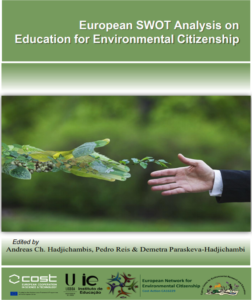Chapter 9: SWOT Analysis of Education for Environmental Citizenship – Country Report: GREECE
George Farangitakis & Themistoklis Sbarounis
Abstract: Environmental Education (EE) in the Greek education system was initiated through a pilot stage for secondary school education in 1987. EE was legislated from 1990-1991 for secondary and primary education. EE in schools is implemented through educational projects that are supported by specialized officials (Environmental Education Officers) in each Prefecture. EE is also supported by the curricula of Science Education (SE) in the different age levels. Since 1993 Environmental Education Centers have been established all over the country by the Ministry of Education in collaboration with Municipalities and the National Youth Institution. The Environmental Education Centers collaborate with Universities, Research Institutes and other Governmental and Non-Governmental Organizations. They provide educational programmes for primary and secondary schools relating to the local environment, teacher training seminars, regional, national and international networks and the production of educational material. EE is also a subject in the Science and the Pedagogic Departments in universities. During the last 12 years there has been a shift from EE to Education for Sustainable Development (ESD), and Environmental Education Centers in particular have implemented Life-Long Learning Programmes (LLP) and Citizenship Education (CE). The challenge for the development of Education for Environmental Citizenship in Greece is linked with the utilization of EE, SE, ESD, and LLP. The question asked is: Which structures and partnerships will undertake the support of the relative education and training? The SWOT analysis reveals the major advantages and the obstacles of such a challenge.

